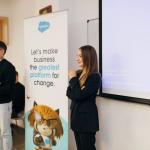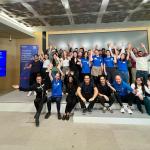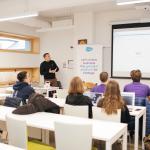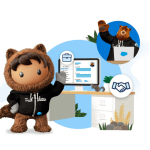What is Solution Engineering? What does a Solution Engineer do day to day? How do I become a Solution Engineer?
Navigating the wonderful world of technology can be challenging and understanding what different roles are available even more so. We sat down with two of our Future Pathways Solution Engineering Apprentices from Salesforce UK to deep dive into what it looks like to be Solution Engineer at Salesforce and to get some inside tips on how to kick start a career in the technology sector.
Meet Ayan Ali and Melissa Alexandra Lupu, two Solution Engineers on the Future Pathways Apprenticeship Program who are everyday trailblazers.


In your own words, how would you describe what a Solution Engineer does at Salesforce?
Melissa – It all started to make sense when I thought about the common frustrations we’ve all experienced with businesses: waiting forever to speak to customer service, dealing with websites that are hard to navigate and prone to crashing, receiving email recommendations for products we have no interest in, or trying to resolve an issue with a product only to find the process is unhelpful, drawn-out, and stressful. These are real problems that companies know about and desperately want to fix, but the journey to improvement is filled with obstacles.
This is where Solution Engineers come into play. Our job is to connect the dots between what Salesforce can do with its powerful suite of Clouds and what businesses need to solve their problems. I think of it as being part tech expert, part detective, and part storyteller. We uncover the problems, find solutions using Salesforce technology, and then demonstrate these solutions in a way that’s easy for everyone to understand. It’s about making real changes that improve customer experiences and business operations, one solution at a time.
Ayan – How I would describe being a solution engineer depends on which part of the role you look at, for the customer-facing side of the role I would describe it as being a performer. You build the story, write the script, and present it to your audience in an enticing way. For the more technical side of the role I would describe it as being an expert, no one else in the deal knows the product or the build the way the Solution Engineer does so we are an integral part of the process and making sure everything goes smoothly.
Why did you decide to do an apprenticeship at Salesforce?
Melissa – I have always enjoyed school so I envisioned myself following a traditional path through A-Levels to my dream university, then onto starting my professional career. However, my journey took an unexpected turn when I chose a BTEC, where I was drawn into a technology-driven environment that quickly educated me on the different career pathways I could choose. For me, apprenticeships are a practical, cost-effective way to jumpstart a career, combining education, experience, and quicker entry into the workforce.
Ayan – I don’t have the most conventional journey into tech! At A-level I never considered tech as an industry I would get into and I did A-levels in politics, psychology and economics. Upon completing my A-levels I attended university for a year and started a degree in economics. I started applying for apprenticeship programs because I didn’t want to just learn theory as you do at university I wanted that on-the-job experience, that’s when I came across Salesforce and I applied. Upon finding out more about the company and doing some research I knew it would be the perfect workplace for me, from their emphasis on philanthropy through the 1-1-1 initiative to their happiest workplace rating I was convinced this is where I needed to be and 18 months on I could not be happier with my decision!
From customer demos to working with teams across the business, Future Pathways apprentices work on real projects and contribute to their teams. Can you tell us about some of the projects that you’ve worked on throughout your apprenticeship so far?
Ayan – A contribution that I am particularly proud of is taking on a booth at the Week of Innovation event. The Week of Innovation is a customer event where there are a few hundred customers and they are invited to hear about all the fun new things Salesforce are introducing to their software. I was assigned the sales cloud booth and although I was apprehensive at first it was very fun. I was giving quick-fire demos and I could see the interest the customers had. It also put my own knowledge to the test and I had to figure out how to navigate the questions that I couldn’t answer. This was also my first experience of dealing with customers alone and I did really well!
Melissa – In my role as a Solution Engineer within the Insurance team, my main responsibility is to engage with insurers looking to revolutionise their operations through Salesforce, specifically leveraging Financial Services Cloud. In response to the increasing interest in Generative AI, I presented Einstein Copilot where users can interact with it using natural language queries and receive accurate and trustworthy responses within seconds. In this demo I not only showcased the dynamic insurance-related capabilities of Salesforce but also illustrated the practical benefits of integrating AI into everyday insurance operations. The feedback was overwhelmingly positive, with the customer expressing a keen interest in how these tools could transform their customer engagement and operational efficiency.
A key goal of any apprenticeship is to grow skills. On the Solution Engineering degree apprenticeship, apprentices are encouraged to grow their skills and they become technical rockstars in no time. What are some of the skills you have developed during your apprenticeship?
Melissa – One key skill that is needed in the Solution Engineer role and that takes time and practice to develop is presentation skills. I’ve learned how to communicate and present a solution in a clear and engaging way. I’ve also really developed my technical knowledge. I’ve learned everything from the basics, like personalising the platform with a customer’s logo, to more advanced tasks like customising business processes and integrating other tools like Tableau and Slack. Lastly, another critical skill in pre-sales is value-selling. Given my technical background, I could easily dive deep into the specifics of how each Salesforce feature works. However, I’ve learned that most customers are more interested in understanding how Salesforce can address their specific challenges—whether it’s saving time by automating routine tasks, enhancing productivity, or unlocking new efficiencies. My role involves highlighting these benefits in a way that’s straightforward and relevant to our customers, showing them the tangible impact Salesforce can have on their operations.
Ayan – I’ve gained so many skills from the Future Pathways program however they key ones are presentation skills and technical confidence. Throughout the start of the program, we’ve had many workshops on how to present, the value of storytelling and how to do it, objection handling and essentially how to deal with most customer interactions. Building this skill has helped me massively when it comes to confidently addressing customers. We also have something called peer certs which are mock customer presentations and these really helped my confidence when it came to presenting. In terms of building my technical skills, this is something you work on at Salesforce from the very beginning. We first start doing basic builds on the platform, then we go on to focus on each of the core products and gain experience with it on the salesforce learning tool Trailhead. Through this little and often approach you end up with so much technical knowledge and subsequently that confidence to talk about it.
Why do you think people should consider careers in Solution Engineering and an apprenticeship at Salesforce?
Melissa – For those considering applying for an apprenticeship at Salesforce, my advice is to embrace the journey with an open mind and a proactive attitude. Show curiosity and willingness to learn, not just about Salesforce’s products but also about the industry and how technology can solve real-world problems. Highlight your unique perspectives and experiences during the application process, demonstrating how you can contribute to the company’s dynamic environment. Remember, an apprenticeship is a stepping stone to numerous opportunities within Salesforce, offering a unique blend of education, experience, and professional growth.
Ayan – For those thinking about applying for an apprenticeship program, I would say go for it! It is honestly one of the best decisions I have made for myself and my career. Be confident in what you bring to the table and be your most authentic self. Research the program you’re applying for and look for people in that role on LinkedIn and see if they can give you any top tips.
Future Pathways Program
Here at Salesforce, we’re innovators and lifelong learners. Together, we chart new paths, drive customer success, develop AI-first technology, and build a better world.



























